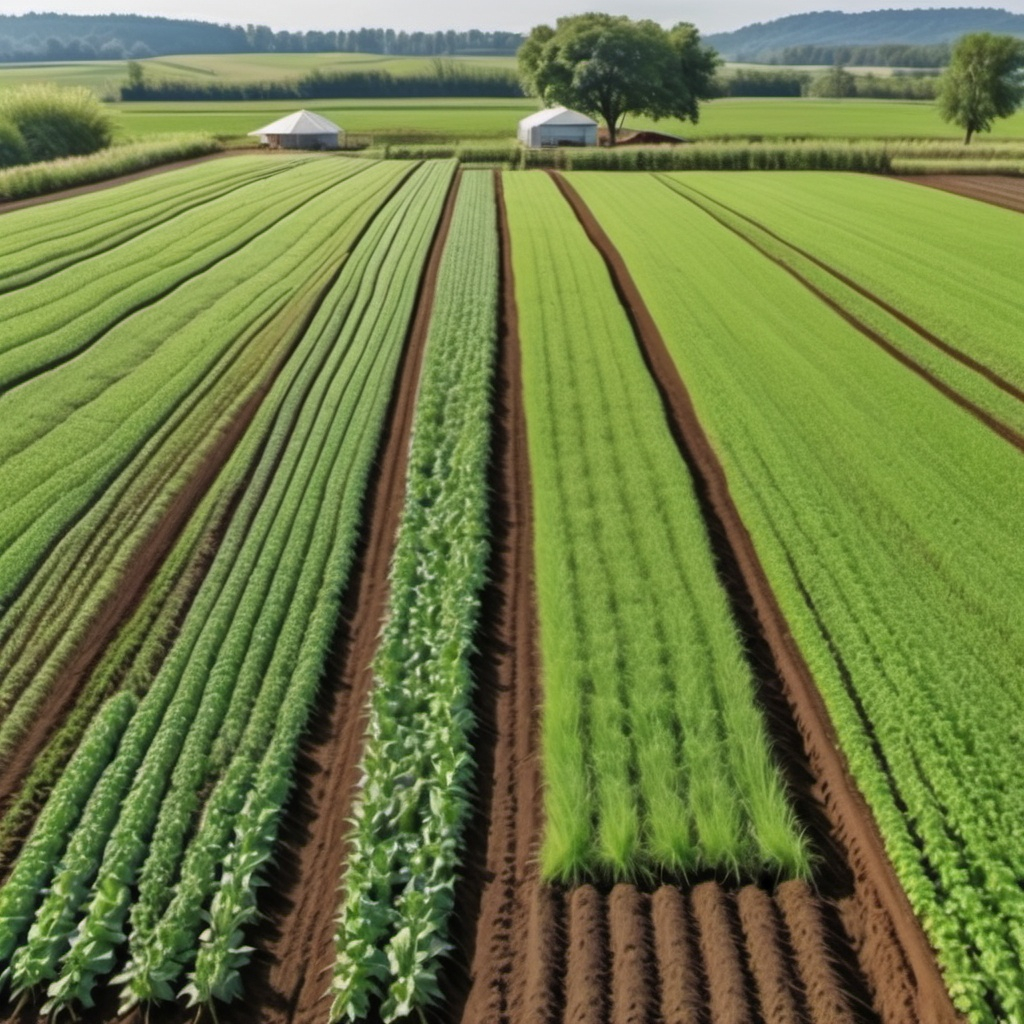
Sustainable farming practices aim to meet the food needs of the present without compromising the ability of future generations to meet their own needs. These practices integrate three main goals: environmental health, economic profitability, and social equity. By utilizing natural processes and minimizing harmful inputs, sustainable farming ensures long-term agricultural productivity.
Crop Rotation
Crop rotation involves growing different types of crops in the same area across different seasons or years. This method prevents soil depletion, reduces the need for synthetic fertilizers, and helps control pests and diseases. Each crop contributes differently to soil health, with legumes like beans and peas enriching the soil with nitrogen, while other crops deplete certain nutrients. This diversity promotes a more balanced and healthy ecosystem.
Agroforestry
Agroforestry combines agriculture and forestry techniques, creating a diverse and resilient farming system. It involves planting trees or shrubs alongside crops or livestock, which provides multiple benefits. Trees offer shade, reduce wind erosion, and improve soil quality through their root systems. Additionally, they can provide products like fruit, timber, and fuel, making farms more economically viable while enhancing biodiversity.
Conservation Tillage
Conservation tillage minimizes soil disturbance by reducing the frequency and intensity of tillage operations. Traditional plowing can disrupt soil structure, increase erosion, and deplete organic matter. By adopting reduced-tillage or no-till methods, farmers help maintain soil health, retain moisture, and prevent erosion. This practice also promotes the build-up of organic material, enhancing soil fertility and structure.
Integrated Pest Management (IPM)
Integrated Pest Management (IPM) is an approach to controlling pests that combines biological, cultural, physical, and chemical tools to minimize harm to the environment. Rather than relying solely on pesticides, IPM encourages the use of natural predators, habitat manipulation, and resistant crop varieties. This reduces chemical usage, prevents the development of resistant pest populations, and promotes a more balanced ecosystem.
Cover Cropping
Cover crops are grown primarily to protect and improve the soil rather than for harvest. They help prevent erosion, improve soil structure, suppress weeds, and enhance biodiversity. Plants like clover, rye, and vetch are commonly used as cover crops. They also contribute organic matter to the soil, improve water retention, and, in some cases, add nutrients through nitrogen fixation.
Water Conservation Techniques
Water conservation is crucial in sustainable farming, especially in areas prone to drought. Techniques such as drip irrigation, mulching, and rainwater harvesting can significantly reduce water use while maintaining crop yields. Drip irrigation delivers water directly to the plant’s roots, minimizing waste. Mulching helps retain soil moisture, while rainwater harvesting collects water for future use, reducing dependence on groundwater.
Organic Farming
Organic farming avoids the use of synthetic fertilizers, pesticides, and genetically modified organisms (GMOs). Instead, it focuses on natural methods of crop production and pest control. Compost, manure, and green manure are used to enhance soil fertility, while natural predators and organic pesticides manage pests. Organic farming promotes biodiversity, improves soil health, and reduces environmental pollution.
Sustainable Livestock Management
Sustainable livestock management focuses on maintaining healthy herds while minimizing the environmental impact of raising animals. This includes practices like rotational grazing, where animals are moved between different pastures to prevent overgrazing and maintain healthy grasslands. Farmers may also adopt feed practices that reduce methane emissions, use integrated systems where livestock and crops benefit each other, and ensure animal welfare is a priority.
Renewable Energy Use
Many sustainable farms are turning to renewable energy sources such as solar, wind, and bioenergy to power their operations. These energy sources help reduce reliance on fossil fuels, lower greenhouse gas emissions, and cut operational costs in the long term. Solar panels and wind turbines can provide electricity for irrigation systems, barns, and machinery, while bioenergy can be produced from farm waste like manure and crop residues.
Biodiversity Conservation
Maintaining biodiversity on a farm is key to fostering a resilient and sustainable agricultural system. By encouraging a variety of plants, animals, and microorganisms, farmers can enhance ecosystem functions like pollination, pest control, and soil health. Hedgerows, ponds, and wildflower areas can attract beneficial insects and birds, while mixed cropping systems promote a diversity of plant species that enrich the soil and prevent pest outbreaks.
Soil Management
Sustainable farming practices prioritize soil health through methods like composting, mulching, and crop residue management. These practices add organic matter to the soil, improving its structure, water retention, and nutrient content. Avoiding heavy machinery and over-tilling also helps prevent soil compaction, erosion, and nutrient loss, ensuring that the land remains productive for future generations.